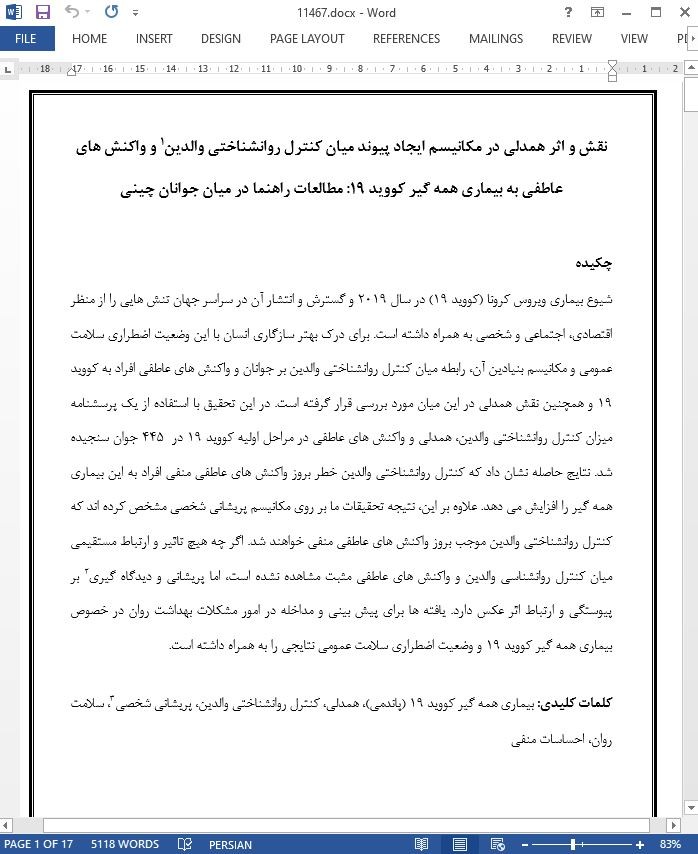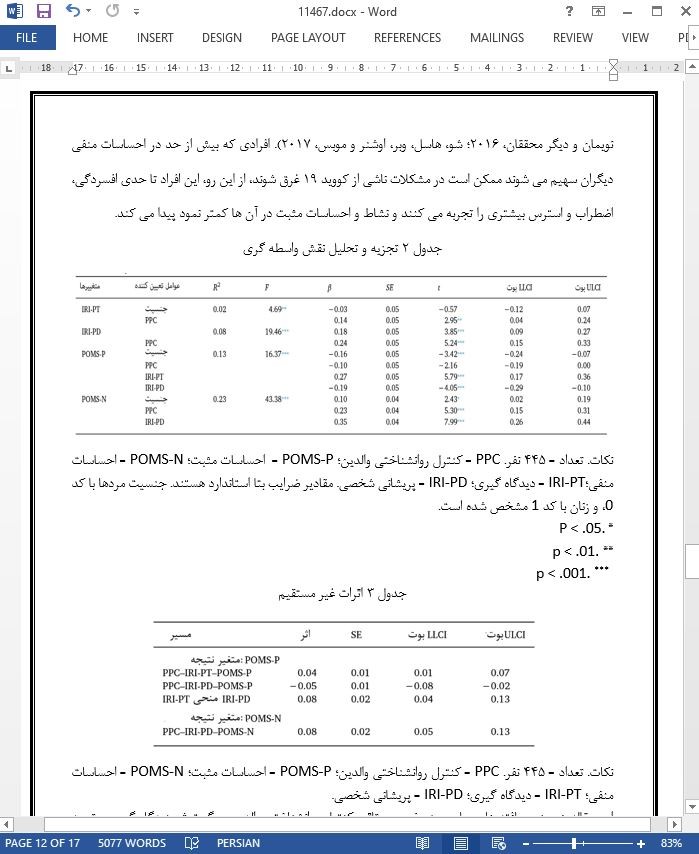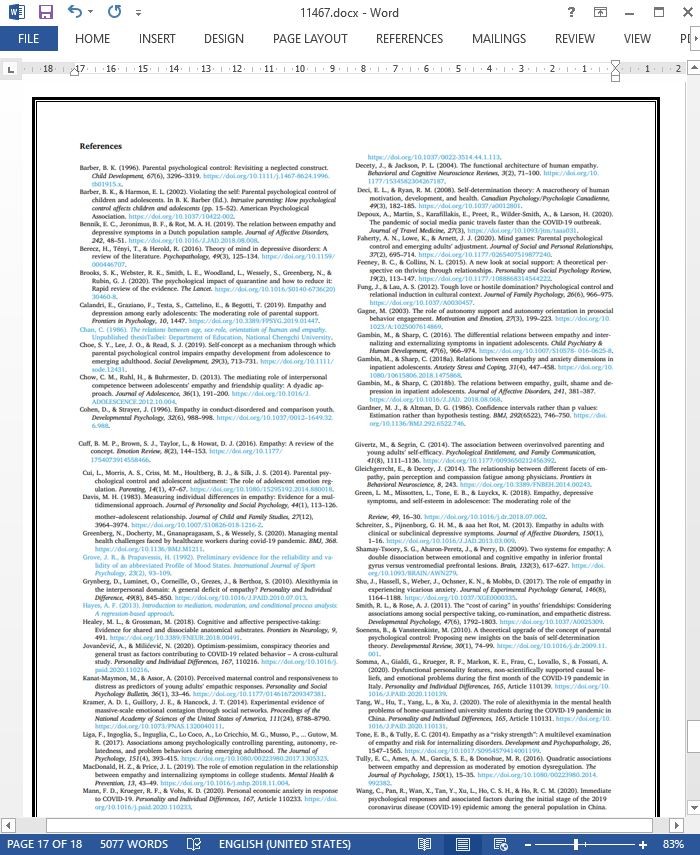
نقش و اثر همدلی در مکانیسم ایجاد پیوند میان کنترل روانشناختی والدین و واکنش های عاطفی
چکیده
شیوع بیماری ویروس کرونا (کووید 19) در سال 2019 و گسترش و انتشار آن در سراسر جهان تنش هایی را از منظر اقتصادی، اجتماعی و شخصی به همراه داشته است. برای درک بهتر سازگاری انسان با این وضعیت اضطراری سلامت عمومی و مکانیسم بنیادین آن، رابطه میان کنترل روانشناختی والدین بر جوانان و واکنش های عاطفی افراد به کووید 19 و همچنین نقش همدلی در این میان مورد بررسی قرار گرفته است. در این تحقیق با استفاده از یک پرسشنامه میزان کنترل روانشناختی والدین، همدلی و واکنش های عاطفی در مراحل اولیه کووید 19 در 445 جوان سنجیده شد. نتایج حاصله نشان داد که کنترل روانشناختی والدین خطر بروز واکنش های عاطفی منفی افراد به این بیماری همه گیر را افزایش می دهد. علاوه بر این، نتیجه تحقیقات ما بر روی مکانیسم پریشانی شخصی مشخص کرده اند که کنترل روانشناختی والدین موجب بروز واکنش های عاطفی منفی خواهند شد. اگر چه هیچ تاثیر و ارتباط مستقیمی میان کنترل روانشناسی والدین و واکنش های عاطفی مثبت مشاهده نشده است، اما پریشانی و دیدگاه گیری بر پیوستگی و ارتباط اثر عکس دارد. یافته ها برای پیش بینی و مداخله در امور مشکلات بهداشت روان در خصوص بیماری همه گیر کووید 19 و وضعیت اضطراری سلامت عمومی نتایجی را به همراه داشته است.
1. مقدمه
بیماری ویروس کرونا 2019 (کووید 19) به یک وضعیت اورژانسی سلامت عمومی تبدیل شده استو دولت ها، مشاغل، جوامع محلی و در کل عموم مردم را درگیر کرده است (گرینبرگ، داچرتی، گناناپراگاسام، و وسیلی، 2020؛ وو و مک گوگان، 2020). از آن جا که کووید 19 تهدید سلامت عمومی، اعمال محدودیت های طولانی مدت برای انواع فعالیت ها، به تبع فشار مالی و سایر عوارض جانبی متعاقب را همراه داشته است موجب پدید آمدن انواع مشکلات روانی از جمله علائم اضطراب، افسردگی، ترس و استرس در عموم مردم شده است (بروکس و دیگر محققان، 2020؛ مان، کروگر، و ووهس، 2020؛ کیو و دیگر محققان، 2020؛ وانگ و دیگر محققان، 2020؛ ژانگ، وانگ، راوچ، و وی، 2020). در پیش بینی اختلالاتی که در طی بیماری همه گیر کووید 19 موجب کاهش سلامت روان می شود، بروز برخی از ویژگی های ناکارآمد شخصیتی، مانند بدبینی (یوانچویچ و ملیچویچ، 2020)، کناره گیری (سوما و دیگر محققان، 2020) و آلکسی تایمی (نارسایی هیجانی) (تانگ، هو، یانگ، و زو، 2020)، تایید شده است. از آن جا که به احتمال زیاد قرار است این وضعیت برای مدتی طولانی در سراسر جهان ادامه داشته باشد، فراخوانی فوری و ضروری برای توجه بیشتر به سلامت روان عمومی صادر شده است. در این زمینه، این مقاله با هدف یافتن عواملی که بیشتر موجب به وجود آمدن خطرات شخصی و خانوادگی در مورد واکنش های عاطفی ناهنجار به بیماری همه گیر کووید 19 می شوند، انجام شده است.
5. نتیجه گیری
در این تحقیق عوامل خطر بالقوه در کاهش سلامت روان در طول پاندمی کووید 19 بررسی شده است و بیانگر کوششی نو در جهت کشف نقش واسطه ای احساس همدلی در رابطه میان کنترل روانشناختی والدین و بروز واکنش های عاطفی در جوانان بوده است. یکی از تاثیرات جرئی و غیر مستقیمی که کنترل روانشناختی والدین بر بروز واکنش های عاطفی دارد از طریق وجود پریشانی شخصی یافت شده است. در کمال ناباوری نتایج نشان داده اند که کنترل روانشناختی والدین توانایی دیدگاه گیری را بهبود می بخشد، این مولفه می توان در مقابل تاثیر منفی پیش بینی شده پریشانی شخصی بر بروز واکنش های عاطفی مثبت به عنوان یک عامل محافظ عمل کند. این یافته ها به درک بهتر توسعه همدلی و تاثیر آن بر مشکلات سلامت روان در دوران پاندمی کووید 19 کمک می کند. با بررسی یافته های این مقاله می توان برای محافظت از افراد در برابر تاثیرات سو روانشناختی در طی پاندمی فعلی ویروس کرونا و شرایط اضطراری عمومی در آینده راهکارهای اندیشید و اقدامات موثری انجام داد.
Abstract
The outbreak of coronavirus disease 2019 (COVID-19) and its worldwide spread have brought economic, social and personal stress. To better understand human adjustments to this public health emergency and its underlying mechanism, the relationship between perceived parental psychological control in emerging adults and individual's emotional reactivity to COVID-19 as well as the role of empathy was examined. The study was conducted among 445 emerging adults using questionnaires measuring parental psychological control, empathy, and emotional reactivities in the initial stage of COVID-19. Results revealed that parental psychological control conferred risks for individual's increased negative emotional reactivity to this pandemic. Moreover, our findings shedlight on personal distress as a mechanism through which parental psychological control induces negative emotional reactivities. Although no direct effect between parental psychological control and positive emotional reactivity was found, personal distress and perspective taking mediate the association in an opposite way. Findings have implications for predicting and intervening mental health problems in COVID-19 pandemic and future public health emergency.
1. Introduction
The coronavirus disease 2019 (COVID-19) has become a public health emergency posing enormous challenges to governments, businesses, local communities, and general public (Greenberg, Docherty, Gnanapragasam, & Wessely, 2020; Wu & McGoogan, 2020). Due to threat to public health, prolonged activity restrictions, financial pressure, and other attendant adverse impacts, COVID-19 has triggered kinds of psychological problems of the general population, including symptoms of anxiety, depression, fear, and stress (Brooks et al., 2020; Mann, Krueger, & Vohs, 2020; Qiu et al., 2020; Wang et al., 2020; Zhang, Wang, Rauch, & Wei, 2020). Some dysfunctional personality characteristics, such as pessimism (Jovančević & Milićević, 2020), detachment (Somma et al., 2020) and alexithymia (Tang, Hu, Yang, & Xu, 2020), were confirmed to predict declines in mental health during the COVID-19 pandemic. As the situation is likely to continue for some time around the world, there is an urgent call for more attention to public mental health. Against this background, the current study aims to further explore the personal and family risk factors concerning the maladaptive emotional reactivities to COVID-19 pandemic.
5. Conclusion
This study examines the potential risk factors for declines in mental health during COVID-19 and represents a new attempt to explore the mediating role of empathy in the association between parental psychological control and emotional reactivity among emerging adults. A partial indirect effect of parental psychological control on the negative emotional reactivity through personal distress is found. The results surprisingly indicate that parental psychological control improves perspective taking abilities, which functions as a protective factor against the negative prediction of personal distress on positive emotion reactivity. The current findings contribute to a better understanding of empathy development and its effect on mental health problems in COVID-19. It also provides some thoughts for conducting effective measures to protect individuals from adverse psychological impacts during the current coronavirus disease and future public emergency.
چکیده
1. مقدمه
2. متد ها
1. 2. شرکت کنندگان
2. 2. مقیاس ها
3. 2. استراتژی تحلیلی
3. نتایج
1. 3. آمار توصیفی و تناظر متغیرها
2. 3.آزمایش برای تعیین اثر میانجی گری
4. مباحثه
5. نتیجه گیری
ABSTRACT
1. Introduction
2. Methods
2.1. Participants
2.2. Measures
2.3. Analytic strategy
3. Results
3.1. Descriptive statistics and correlations of variables
3.2. Testing for mediation effect
4. Discussion
5. Conclusion
- اصل مقاله انگلیسی با فرمت ورد (word) با قابلیت ویرایش
- ترجمه فارسی مقاله با فرمت ورد (word) با قابلیت ویرایش، بدون آرم سایت ای ترجمه
- ترجمه فارسی مقاله با فرمت pdf، بدون آرم سایت ای ترجمه



